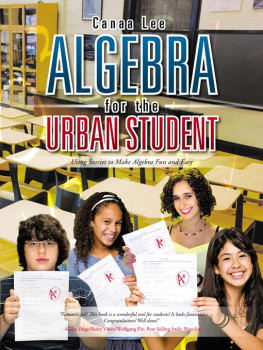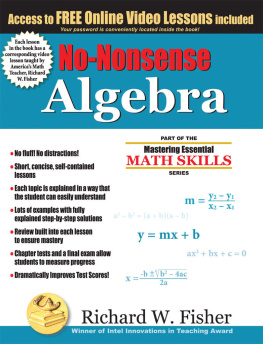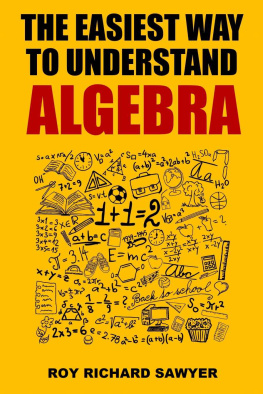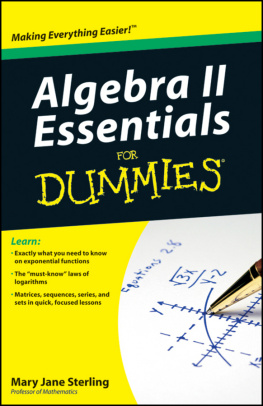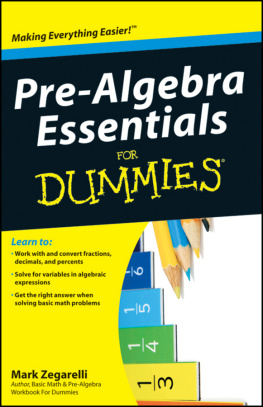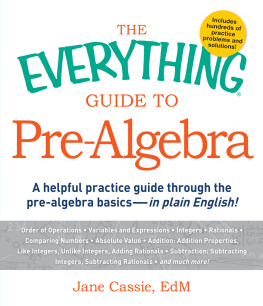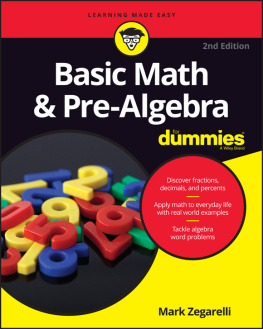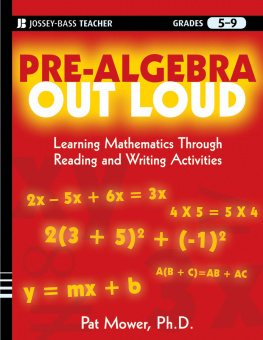ALGEBRA FOR THE URBAN STUDENTS Using Stories to Make Algebra Fun and Easy CANAA LEE iUniverse, Inc.
Bloomington ALGEBRA FOR THE URBAN STUDENT Using Stories to Make Algebra Fun and Easy Copyright 2012 by Canaa Lee. All rights reserved. No part of this book may be used or reproduced by any means, graphic, electronic, or mechanical, including photocopying, recording, taping or by any information storage retrieval system without the written permission of the publisher except in the case of brief quotations embodied in critical articles and reviews. iUniverse books may be ordered through booksellers or by contacting: iUniverse 1663 Liberty Drive Bloomington, IN 47403 www.iuniverse.com 1-800-Authors (1-800-288-4677) Because of the dynamic nature of the Internet, any web addresses or links contained in this book may have changed since publication and may no longer be valid. The views expressed in this work are solely those of the author and do not necessarily reflect the views of the publisher, and the publisher hereby disclaims any responsibility for them. Any people depicted in stock imagery provided by Thinkstock are models, and such images are being used for illustrative purposes only.
Certain stock imagery Thinkstock. ISBN: 978-1-4759-1555-6 (sc) ISBN: 978-1-4759-1556-3 (ebk) iUniverse rev. date: 05/07/2012 CONTENTS BREAKING IT DOWN:
FACTORING QUADRATIC EXPRESSIONS THE FUNCTION WITH MANY FACES:
THE POLYNOMIAL In 2004, I was a high school math teacher at Little Rock Central High School. As a part of the campus improvement plan, Central High School wanted to promote literacy across the curriculum. Every content area teacher needed to utilize reading strategies. why do I have to teach reading in math? It was challenging enough teaching the concepts and now we were expected to teach reading too! Often times I found myself reading and explaining everything in the book. why do I have to teach reading in math? It was challenging enough teaching the concepts and now we were expected to teach reading too! Often times I found myself reading and explaining everything in the book.
This took a lot of time and was also very exhausting. Unfortunately, this did not help students comprehend the material. In addition, encouraging students to do homework was almost impossible. Usually, from the time students left class until they got ready to do their homework, they had forgotten almost everything we talked about in class. What is a teacher to do? The most effective way for me to incorporate reading in algebra was to select the topics that had a common theme and infuse them into story. The vocabulary in the textbook was advanced for my students; as a result, they found the concepts difficult and were easily frustrated.
For example, there is a unit called Family of Equations and Inequalities. Now, my s tudents would learn the main algebra topics and learn the math skills at the same time! As an expert algebra teacher, I understand that algebra is based on the concept of a line. However, there are many skills students must master in order to master the concept. Through the use of culturally relevant stories and utilizing the graphing calculator daily, my students were finally able to make the connection between skills and the concepts. The stories help students follow along throughout the whole unit. There are questions asked along the way so students are able to demonstrate your understanding.
The assessments are directly related to the unit so students have the opportunity to incorporate the graphing calculator in almost every unit. Writing units and creating real world performance assessments required a lot of hours outside of the normal work day. However, when I put my creative hat on, there was no stopping me. It was imperative for me to show my students that algebra is more than just a bunch of letters and numbers with no meaning. For example, relating parabolas to a hill or a valley is an idea every student can relate; illustrating the relationship between linear equations and inequalities helps students understand that everything in algebra is related and is not really that hard at all! My algebra students inspired Algebra for the Urban Student . It started off as just a collection of units for my students so I could ensure that were exposed to and mastered all the topics for the assessments.
Parents commented on homework assignments because they could now help their children with their homework because it was easy to understand and follow without even stepping foot in my class! My students liked coming to class because they wanted to know the next story I had written. For the first time, many students understood their homework and could complete their assignments. Also, students were improving their reading and comprehension skills in both English and algebra! I had written enough units and assessments to write a book. Textbooks are designed for math teachers and professors; Algebra for the Urban Student is intended for the common student. Algebra and Urban Students: The Gateway to Success in the st Century A critical and strategic examination of the social science and popular literature concerning urban students highlights a distressing depiction of their mathematics achievement. This trend disheartens me even more because of the disproportionate number of Black and Latino kids in urban schools who are not being adequately prepared in mathematics.
According to the National Assessment of Education, a division of the U.S. Department of Education, over 60 percent of this population has not reached basic proficiency levels in their mathematics subjects at the middle and high school levels, particularly in Algebra. This occurs at a time when our nation has made an increased emphasis on STEM (Science, Technology, Engineering and Mathematics) in secondary and postsecondary education to main our position as a world superpower. Increasing the number of urban students who are successful in Algebra and other high-level mathematics courses has to become an educational imperative. This educational investment into our urban students is very likely to yield great returns. Algebra and the Urban Student: Using Stories to Make Algebra Easy and Fun makes an important and much needed contribution to a highly important educational issue in urban schools and beyond.
Canaa Lee has assembled a powerful collection of chapters that make Algebra relevant and achievable for urban students. Additionally, the activities will allow urban students to understand that Algebra can be fun. I am particularly excited about this book because it allows hands-on activities for educational practitioners to build the mathematics skill set of our students. It is my hope that this book will encourage others to produce books and other written contributions that are hands-on and able to be easily implemented into Algebra classrooms. Further, I hope that educators will truly see the value of this book for its potential in raising the achievement levels of urban students in Algebra. In closing, I commend Canaa Lee for putting this book together.
These chapters bring thought-provoking and real-world perspectives to Algebra. As a result, I will certainly add this book to my library. I hope you enjoy! Chance W. Lewis, Ph.D. Carol Grotnes Belk Distinguished Professor of Urban Education College of Education The University of North Carolina at Charlotte E-mail: Web: http://www.chancewlewis.com This book is inspired by the students I teach. So many times students do so well in class, but when they leave my classroom they have forgotten everything or are confused as to how to do their homework.
My students would say to me, I wish I could stick you in pocket and take you home with me. Because I heard this so frequently from them, I started writing stories for my students. The activities are guided practice exercises so they would have a navigation system to guide them through the entire assignment. It is closest thing to having me right there with them as they were doing their homework. My stories became a hit with the students and parents alike. I have written enough stories to compile them all into a book.
Next page
